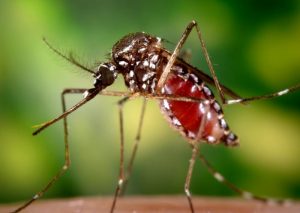By NewsDesk @infectiousdiseasenews
The Thailand Bureau of Epidemiology reported an additional 775 chikungunya cases in the past week, bringing the country total to 6,888 since the beginning of the year in 68 provinces. No fatalities have been reported.

Chanthaburi, Uthai Thani, Lamphun and Rayong provinces have reported the highest incidence.
Pathumthani, Singburi, Ang Thong, Nakhon Nayok, Mae Hong Son, Uttaradit, Nong Khai, Udon Thani and Yasothon provinces have not reported any cases year-to-date
Chikungunya virus (CHIKV) is transmitted by the bite of Aedes mosquitoes, particularly Aedes aegypti and Aedes albopictus. In humans bitten by an infected mosquito, the disease symptoms usually appear after an incubation period of three to seven days (range 1- 12 days).
CHIKV can cause acute, sub-acute, and chronic disease.
In acute disease, symptoms develop abruptly and include high fever, headache, myalgia and arthralgia (predominantly in limbs and large joints). The appearance of a maculopapular rash is also frequent. Severe forms of the disease are rare. Symptoms usually resolve in 7-10 days, although arthralgia and joint stiffness may persist intermittently for several months.
The disease shares some clinical signs with dengue and Zika, and can be misdiagnosed in areas where they are common. As there is no cure, treatment is focused on relieving the symptoms.
- Spain: First West Nile virus deaths reported in Seville outbreak
- Blood clots and lung injuries found in patients who have died of COVID-19
- 11th Ebola Virus Disease Outbreak in DRC nears 100 cases
- Human herpesvirus 6B (HHV-6B): Vaccine developed
- Florida Keys: Oxitec gets approval to release Aedes aegypti mosquitoes
- Diphtheria outbreak in Shan State, Myanmar
- Philippines COVID-19 cases rise to 178K, Vaccine likely available in Q2 2021
- Massachusetts General Hospital researchers show children are silent spreaders of SARS-CoV-2


